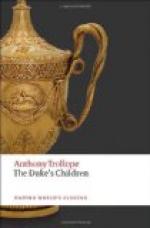‘Thank you, sir,’ murmured Gerald.
’But how can I wash your young mind clean from the foul stain which has already defiled it? Why did you sit down to play? Was it to win the money which these men had in their pockets?’
‘Not particularly.’
’It cannot be that a rational being should consent to risk the money he has himself,—to risk even the money which he has not himself,—without a desire to win that which as yet belongs to his opponents. You desired to win.’
‘I suppose I did hope to win.’
’And why? Why did you want to extract their property from their pockets, and to put it into your own? That the footpad on the road should have such desire when, with his pistol, he stops the traveller on his journey we all understand. And we know what to think of the footpad,—and what we must do to him. He is a poor creature, who from his youth upwards has had no good thing done for him, uneducated, an outcast, whom we should pity more than we despise him. We take him as a pest which we cannot endure, and lock him up where he can harm us no more. On my word, Gerald, I think that the so-called gentleman who sits down with the deliberate intention of extracting money from the pockets of his antagonists, who lays out for himself that way of repairing the shortcomings of fortune, who looks to that resource as an aid to his means,—–is worse, much worse, than the public robber! He is meaner, more cowardly, and has I think in his bosom less of the feeling of an honest man. And he probably has been educated,—as you have been. He calls himself a gentleman. He should know black from white. It is considered terrible to cheat at cards.’
‘There was nothing of that, sir.’
’The man who plays and cheats has fallen low indeed.
‘I understand that, sir.’
’He who plays that he may make an income, but does not cheat, has fallen nearly as low. Do you ever think what money is?’
The Duke paused so long, collecting his own thoughts and thinking of his own words, that Gerald found himself obliged to answer. ‘Cheques, and sovereigns, and bank-notes,’ he replied with much hesitation.
‘Money is the reward of labour,’ said the Duke, ’or rather, in the shape it reaches you, it is your representation of that reward. You may earn it yourself, or, as is, I am afraid, more likely to be the case with you, you may possess it honestly as prepared for you by the labour of others who have stored it up for you. But it is a commodity of which you are bound to see that the source is not only clean but noble. You would not let Lord Percival give you money.’
‘He wouldn’t do that, sir, I am sure.’




